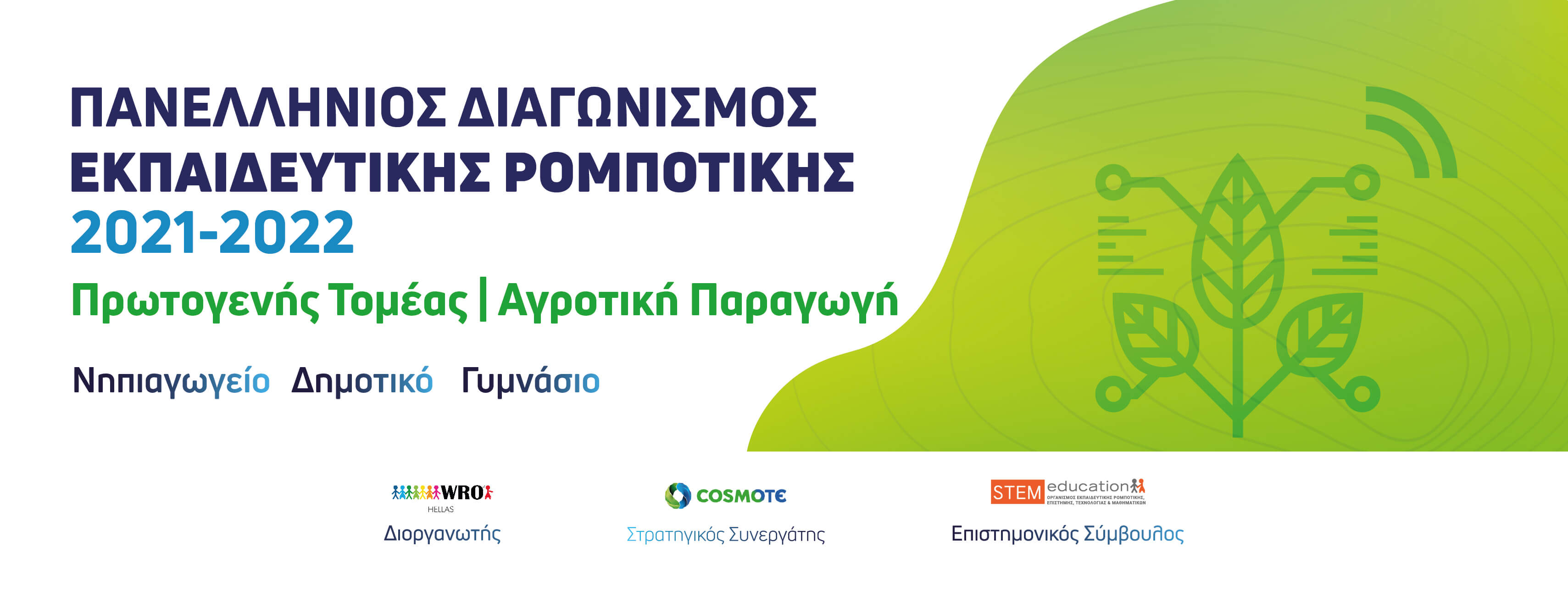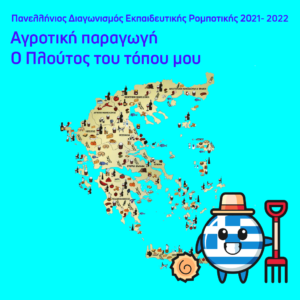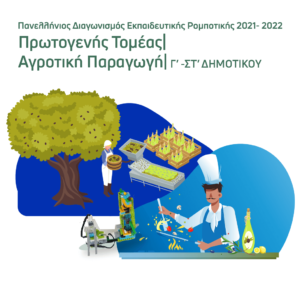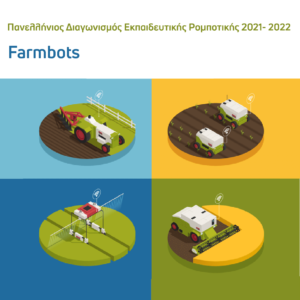
The Panhellenic Educational Robotics Competition is organized for the 8th consecutive year by WRO Hellas with Strategic Partner COSMOTE.
For the school year 2021-2022, the Competition is under the auspices of the Ministry of Education and Religions.
The big celebration of educational robotics is here
and is addressed at the same time to all levels of compulsory education!
The Panhellenic Educational Robotics Competition is a unique way for students to understand science, programming and automation, to learn to think like engineers, to develop their problem-solving skills and to expand their creativity. By exploring these skills in a practical and participatory way, children develop the supplies they need today and for the future, whatever career choice they follow.
During their preparation for the competition, the students, under the guidance of their teacher-coaches:

They will form groups
(teamwork)

They will study the relevant literature and experiment
(critical thinking)

They will explore the science of engineering
(engineer thinking)

They will identify challenges and suggest solutions
(problem solving)
At the same time, within the framework of the Panhellenic Educational Robotics Competition, free training seminars for the coaches of the teams that will participate in the competition will be held. The training seminars will be held remotely.

COMPETITION CATEGORIES
The Panhellenic Educational Robotics Competition is addressed to students of all school levels from all over Greece. Different educational goals are set for each level, and therefore different competition categories and competition criteria.
The elements that compose the new competition include the following innovations:
- Single theme for all ages
- The introduction of simple machines
- The introduction of the measurements in the Primary School
KINDERGARTEN
Get to know the products of our place (Non-competitive category)
Kindergarten students create groups of 6-10 children. Each team creates a floor track that is made of materials of their choice and depicts, in a three-dimensional way, the local products and their promotion. With the help of a floor robot that moves on the track, it can demonstrate the flow of production of Greek traditional products such as:mastic or restes of Chios, manouri of Sifnos, sausages of Trikala, gruyere of Naxos or Crete, belte (tomato juice) of Milos, Turkish delight of Syros, currant of Corinth, pistachio of Aegina and so many other fine products. According to the instructions given by the children to the robot, our teams show what the products of their place are and make us understand that their area is part of a wider system. Through this activity, students will create their first algorithm.

Primary School
Primary Sector – Agricultural Production (Open Category) A’- D ‘Elementary
Primary school students create groups of 6-10 children and implement projects after studying the relevant literature and experimenting, will suggest solutions with at least 3 mechanisms that use simple machines and mandatory presentation on the WRO Hellas channel, based on specifications for the videos to be posted.
Primary Sector – Agricultural Production (Open Category) 3rd-6th grade
In the last grades of elementary school (C’-ST’) students will create groups of 3-6 children. They will study the relevant literature, experiment, explore the science of engineering and propose solutions with mandatory at least 3 automations with the camera (one of them) to run in parallel with the animation in Scratch. Communication with the microbit for measurements will be mandatory from this year in this category.
2×2 Soccer (Robotic Soccer Game)
In this game 2 rival alliances consisting of 2 remote controlled robots each, chase a ball, on a specially designed table (soccer field). The goal of each alliance is to win the game, scoring more goals than its opponents.
New rules have been added to this year’s competition



HISTORICAL TOPIC
1821 – 1921: 100 years of Modern Greece (Regular Category)
Through this test, the participants and their robots can follow the Greek army during its operations for the liberation of Thessaloniki and Ioannina. The journey of the “robotic troops” starts from Thessaly (start / end area), the borders of the Greek state at that time, where the troops of Thessaly and Macedonia under the instructions of King George I and Prime Minister Eleftherios Venizelos begin the difficult task of liberating the two cities.

JUNIOR HIGH SCHOOL
Farmbots (IoT και Physical Computing)
The United Nations predicts that the world population will reach 9.7 billion by 2050 and this will cause the need to increase agricultural production by 65%.
To meet this growing demand, farmers and agricultural enterprises are called upon to use new technologies to increase and optimize the products produced. That is why they are turning to the use of intelligent robotic systems, equipped with sensors and actuators, that use the Internet of Things (IoT). Applying them to agriculture will help farmers improve their processes by providing data and making real-time decisions.
The potential of these technological tools is enormous and their scope in agricultural processes covers a wide range of fieldwork such as field analysis, sowing, surveillance and harvesting.
In this context, create your ownfarmbot,
with the help of technologies IoT will improve agricultural production in one or more of the following areas:
- Field control
- Sowing
- Irrigation
- Spray
- Development control
- Harvest and quality control

SENIOR HIGH SCHOOL
SENIOR HIGH SCHOOL
My friend, the Robot (Open category)
For the WRO Open Class in 2022, teams have the task of developing a robot model that represents the robot as a friend and helper in people’s daily lives. Teams can choose one of three areas (1, 2, 3) to work on, but they can also choose to work on a project that focuses on a combination of these three areas.
1. Robots at home
2. Robots to the rescue
3. Robots in Health

Vocational High School
Agricultural Production and Standardization (Open category)
This category invites students and teachers of EPAL. to inspire, design and manufacture robotic machines, mechanisms, components, automations, miniature factories or miniature factory parts, which:
- They will assist in the production, processing, standardization of agricultural or livestock or fishery products while ensuring the conservation of natural resources
- It will be in accordance with international standards
- They will improve existing procedures

Registration Form
(** The number of entries is equal to the number of groups you want to register. Below you can find the parental consent form and add it to your completed form, one for each student. You will have the form with you on the day of the competition printed to submit it to those in charge.)


